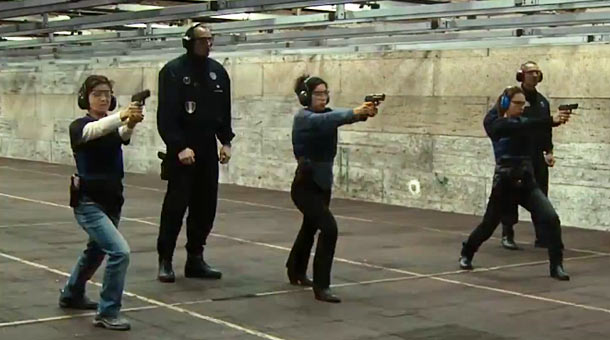
Most of what keeps Polisse so involving is seeing whether or not the film will collapse on itself.

Most of what keeps Polisse so involving is seeing whether or not the film will collapse on itself.
Polisse, which won the Jury Prize at Cannes last year, is a very hectic film. Subplots come and go at an alarmingly fast rate, the main cast comprises of almost a dozen characters with each one being focused on at random times and the amount of ground the film covers is earning it comparisons to television shows like The Wire and Law and Order. There is so much going on in Polisse that at times it feels like director/co-writer/co-star Maïwenn is flailing around trying to save herself from letting the movie drown her. Most of what keeps Polisse so involving is seeing whether or not the film will collapse on itself, and it’s somewhat remarkable that Maïwenn is able to mostly succeed by the end.
For the most part Polisse is episodic and (intentionally) plays out like a documentary. We’re shown the daily ins and outs of the Child Protection Unit in Paris. We’re treated to different cases the Unit is working on that range from being amusing to downright disturbing. We get some brief glimpses into the personal lives of some of the officers whether it’s seeing them at home with their families or watching their problems spill out in their work. There’s only one major plotline involving Melissa (Maïwenn), a photographer who’s assigned to do a series on the unit by the government. She slowly starts getting accepted into the group of officers she’s following and eventually strikes up a relationship with one officer (Joey Starr).

The bulk of the film is made up of the various cases that the Unit handles throughout a typical day of work. These vignettes are where Polisse mostly shines. Maïwenn co-wrote the script with Emmanuelle Bercot and the film opens with a title card stating that some scenes are directly lifted from real-life cases the CPU has encountered. It’s hard not to believe that claim since some of the crimes the officers encounter are so bizarre that it would be impossible to make up. Maïwenn pulls no punches with the material either, presenting everything with the same documentary-like indifferent approach. Pedophilia, rape, abortion, kidnapping and other topics are dealt with but the camera never flinches at either one of them since it’s merely part of the job.
Where Maïwenn seems to have her greatest strength is with the cast. Coming from an acting background herself it makes sense that she would end up being more of an actor’s director, and it’s evident throughout. With everything happening in Polisse at such a fast rate, every character in the main cast is able to stand out and work together as an ensemble. There are a lot of confrontations that come perilously close to being nothing more than cheesy melodrama, but the cast is good enough to keep things scaled back enough so that it’s great drama to watch unfolding on screen.
What keeps Polisse from being something truly great is Maïwenn’s attempts to dig deeper into the characters’ lives. Because of the large cast and episodic nature of the movie, the most she can get out of the personal lives of the CPU officers is that it’s hard to remove themselves from their work when they come home. This kind of “revelation” isn’t exactly hard to get, so the scenes where the same point is hammered home fall flat. Unfortunately Maïwenn decides to end things with a big character moment that’s more laughable than profound. When Polisse sticks to its realistic fly-on-the-wall approach to the CPU it’s some of the best filmmaking from this year, but its poor attempts to make the film more of a character piece hold it back from being truly great.